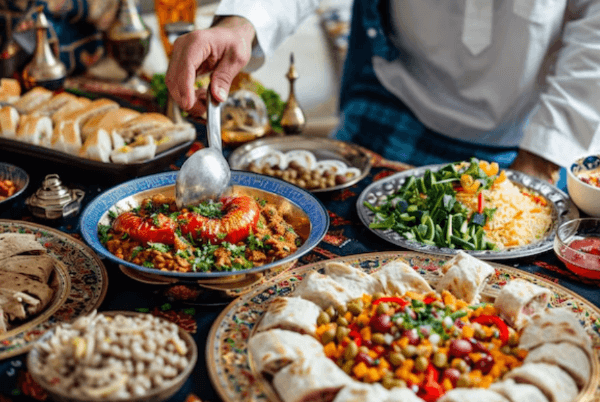Client Testimonials: Share reviews satisfied clients, particularly for large events.

1. Key Elements for Effective Catering Content
- High-Quality Visuals: Professional, high-resolution photos and videos are crucial for presenting food. The presentation of dishes, setup at events, and ambiance must look inviting and appetizing.
- Clear and Informative Descriptions: Provide detailed descriptions of your offerings—ingredients, portion sizes, pricing, and customization options (e.g., vegetarian, vegan, gluten-free, or ethnic specialties).
- Seasonal Menus: Highlight any seasonal offerings (e.g., holiday or summer menus), which attract clients looking for fresh or themed options.
- Flexibility: Emphasize the ability to tailor menus for different events, dietary restrictions, and preferences.
- Customer Experience: Focus on seamless customer service, including setup, staff professionalism, and the ability to handle events of any size.
2. Content Ideas for Catering
- Visual Menu Presentation: Create a photo or video gallery showcasing your catering menu, featuring both individual dishes and full banquet setups.
- Event Recaps: Share stories and visuals from successful events you've catered. Show how your team handles different occasions, from small parties to large-scale weddings.
- Food Preparation Videos: Share time-lapse videos or tutorials that demonstrate how your team prepares certain signature dishes or handles large quantities of food.
- Themed Catering Ideas: Write articles or create posts about themed catering ideas for weddings, corporate events, holiday parties, and more. For example, "Top 5 Ideas for a Mediterranean-Themed Wedding" or "How to Create a Cozy Winter Catering Menu."
- Social Media Showcases: Use Instagram, Facebook, and TikTok to share drool-worthy photos of dishes, customer testimonials, or quick behind-the-scenes looks at event setups.
- Recipe Cards: Share simple recipes of some popular dishes or offer a downloadable PDF with tips on how to recreate a few of your catering staples at home.
- Seasonal or Special Offers: Promote seasonal deals or discounts on catering services for major holidays, events, or specific customer segments (e.g., early bird booking discounts).
3. Best Platforms for Catering Content
- Instagram: Ideal for sharing high-quality food images, event photos, and client testimonials. You can also post stories that show behind-the-scenes moments and engage directly with your audience through polls and Q&A.
- Pinterest: A great platform to share visually appealing boards with wedding catering ideas, themed event menus, or DIY event planning tips.
- YouTube: Create a channel that includes catering tips, chef interviews, full event showcases, or cooking demonstrations.
- Facebook: A good platform for longer form posts, customer reviews, and event recaps. Facebook Ads can also help target local customers or event planners.
- Blogging: Start a blog on your website that offers detailed posts on different types of catering, customer stories, or expert tips for event planning.
- Email Newsletters: Use newsletters to keep clients informed about new menus, seasonal specials, or upcoming events.
4. Content Writing Tips for Catering
- Highlight Your Expertise: Use your blog or social media posts to showcase your knowledge of event planning, menu creation, and how you handle different dietary needs.
- Use Mouth-Watering Descriptions: When writing about food, make the descriptions vivid and sensory, highlighting flavors, textures, and the uniqueness of your dishes.
- Tell a Story: Personalize your catering service by sharing stories about how you helped create memorable moments at past events.
- Show the Benefits: Emphasize how your catering service simplifies event planning, offers diverse menu options, or ensures the highest food quality.
Menu Showcases: Highlight different catering menus, from gourmet options to customizable menus for various dietary needs.
5. Visual Content Tips
- Photography:
- Food Presentation: Showcase perfectly plated dishes in natural light to highlight the freshness and appeal of the food.
- Event Setup: Show beautifully decorated tables, buffet lines, and drink stations to give potential clients an idea of what they can expect.
- Action Shots: Feature your staff in action—setting up, serving, and interacting with guests at events.
- Video:
- Event Highlights: Create short highlight reels of major events, showing both the setup and guest reactions to the food.
- Behind-the-Scenes: Give a sneak peek of the cooking process, showing the skill and dedication of your kitchen team.
- Client Testimonials: Video testimonials can have a stronger impact, showing real clients speaking about their experiences.
- Time-Lapse of Setup: A time-lapse of your team setting up an event can give viewers a sense of the scope of your work and the professionalism involved.
6. Monetizing Catering Content
- Lead Generation: Use your website and social media content to attract clients by including strong calls-to-action (CTAs) like “Book Now” or “Get a Free Quote.”
- Affiliate Marketing: Partner with related services (e.g., event venues, wedding planners, rental services) to promote each other’s businesses.
- Online Cooking Classes: Offer virtual cooking classes where you teach popular catering dishes or event planning skills.
- Sponsored Events: Feature brands or sponsors in your content during high-profile catering events to increase revenue streams.
7. Customer Engagement Strategies
- Offer Free Tastings or Demos: Use content to promote free tasting events or live cooking demos that showcase your culinary skills.
- Exclusive Menus for Subscribers: Create exclusive menus or special offers for people who sign up for your newsletter.
- Interactive Q&A: Host live Q&A sessions on social media where potential clients can ask questions about menu customization, event planning, or dietary accommodations.




